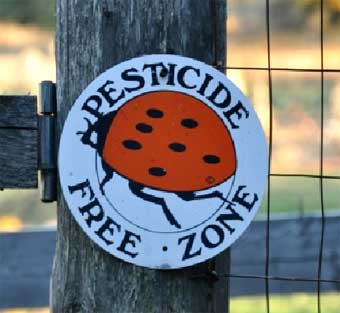 |
 |
 |
 |
 |
 |
 |
 |
 |
 |
|
Greentree Naturals Newsletter Summer 2014
No pesticides here! The weather has changed since we first started farming here 25 years ago. Springtime is a roller coaster ride of hot/cold/rain/hot/cold/rain - repeat. These extremes bring challenges growing food using the same methods we used to use. The frequent 40 degree temperature fluctuations from morning to night are a challenge for most garden plants. The storms seem to be a bit more extreme, higher winds, more hail, extreme downpours, and when it gets hot, its hotter for longer than it used to be. We observe change and adjust as best that we can. We are finding that there are simple things we can do to improve our growing environment and we make every effort to extend the growing season with the goal of adapting to whatever Mother Nature decides to give us. The plants want to grow and we nurture them through the spring and early summer to finally grow into a bounty of produce that feeds our community and stocks our freezer with food. Our season extension techniques are expanding from hoop houses to include a high tunnel, black plastic, shade cloth and row covers. Our food system is being challenged by these weather changes. Deny this if you will, but it is a clear reality that most farmers acknowledge. We have taken way too much for granted assuming there will always be enough water to grow food, or land to grow that food on. As parts of the country dry up and shift food production acres into little dust bowls of dry, cracked earth, all the more reason to focus on your local farmers, local food system, and show your support in any way that you can. We are certified organic farmers, and we love what we do, but it gets more challenging every year. Combine the climatic challenges with the physical challenges that come with aging, and we are forced to consider different perspectives as we look toward our future. I have the goal of figuring out a way to perpetuate our farm with the next generation farmer here. I want this land that we have nurtured these past 25 years to continue growing food for future generations in our community so that our good stewardship will persevere over time. One of our former apprentices is anxious to start farming full time and we are trying to figure out a way to help make this happen. I know that the American Farmland Trust is an organization that works on preserving farmland, and we will definitely make contact with them about this endeavor as well. I believe that they mostly focus on large scale farming operations, but see the need to preserve small acreage farms just as much. We want to remain on this piece of land that we have come to love so dearly for as long as we can. Now that we are officially “elders of the land”, we need to look at not physically working quite so much, but want to continue our good stewardship here. We want to keep teaching others how to grow good food sustainably and cultivate the next generation of small acreage farmers. That said, we will know more later. People keep asking when we are going to “retire”. When I think of retirement, I think of stopping doing what you have to do to do what you want to do. We are doing what we want to do, so why should we stop doing it? To retire to do what? Neither of us have an interest in traveling, we both did plenty of that in or youth. So there you have it. The farmers “retirement” is simply this: “I was tired today and I’ll be tired again tomorrow – hence, I am re-tired”. To be a farmer, a person has to have a good work ethic. We often work with twenty-something young adults that come to apprentice with us. Most of the time, they really don’t have a clue what work ethic means, which ends up being a bit of a frustration for us to attempt to teach this to them along with how to grow an organic garden. Thom and I were both raised in a way that told us that we always needed to give whatever we were doing our best. This twenty-something generation seems to be only interested in giving the minimal amount of effort to whatever task they take on; so how do we teach them to give more, care more, achieve more? It is a quandary that is most perplexing. How do you encourage someone to want to do better than just enough? We have had many apprentices over the years, and while some have gone on to discover farming on their own account, some have determined that it’s just too much work. The apprentices that we’ve had that were truly into farming spoiled us into thinking that all that come here come with a commitment to excellence. We certainly don’t expect anyone to work as fast as we do; we have a lifetime of experience that has taught us how to go about things with the least amount of resistance. I suspect there are a multitude of references out there that may assist us with teaching work ethic, but frankly, taking the time to teach someone how to grow food, and do it in a productive manner is a combination that already takes additional time. Work ethic is a belief in the moral benefit and importance of work and its inherent ability to strengthen ones character; it’s about integrity, sense of responsibility, putting emphasis on quality, being disciplined enough to finish tasks, and be able to work as a team to meet goals. So how do you instill this in someone that is twenty-something years old and doesn’t have a clue that there is a reason for it? We have two apprentices this year. One is a 54 year old woman who lives five miles up the road from us. Linda is an avid gardener, but has spent most of her gardening landscaping with flowers and herbs and wanted to learn how to grow vegetables using season extension techniques. This is perfect for her and we are so grateful to have someone that is enthusiastic and capable of accomplishing tasks in a timely manner. Our 23 year old, Griffin, is a pleasant young man who has persevered through the gardening season and has managed to improve his garden skills appreciably since he first came to us. I think his perspective of farming may have changed and I do believe he has learned to like eating fresh vegetables for the first time in his life! A little over a year ago, our new dog Henry was running and playing and hit me from the side when he was running as hard and fast as he could; the result was that the collision damaged my knee pretty badly. Because we didn’t have health insurance, I never went to the doctor and spent six months using a cane and hobbling about for over a year now. In January, Obamacare kicked in and for the first time in over fifteen years, I have full health benefits. I’ve been in for an MRI, had two orthopedic surgeons like at my knee, had a basic health check up, and am happy to report that with the co-pay, we won’t have to sell the farm to get my knee repaired. I don’t care what anyone says, this program is very good for someone like me and I and I am so grateful. I will wait until the end of the growing season, at which time I will have knee surgery and get this darned thing fixed up so I can walk without a limp. This is our 19th year with our CSA program. I am pretty sure that we were the first to try a CSA in Bonner County and may be the only farm that has continued with the program for this long; at least around here. Our members have been faithful supporters and we are most grateful to have the opportunity to provide them with the best that our gardens have to offer. The garden is growing progressively and abundance is the certain outcome. Now that the summer heat got turned on, you can almost see the corn and squash growing! I am so looking forward to that first ripe tomato; I don’t eat tomatoes any other time of year than when ours are ripe. Yes, I am a proud veggie snob and don’t deny it. Some things are just better because you take the time to wait for the best. I won’t eat corn that isn’t ours either…our sweet corn is THE BEST! We have several on-farm research projects going on for the next three years. One with University of Idaho to study growing vegetables in a high tunnel vs. hoop house vs. outside, and the other project with Washington State University studying beneficial insects in brassicas. We enjoy doing studies that may improve production for ourselves as well as other farmers. We will host an on-farm field day later this summer so the graduate students can share what they learned with others. If you have any interest in keeping up with what we do here on a more frequent basis, visit us on our Facebook page; there are photos of what’s happening on the farm and updates on daily activities. I understand that Facebook certainly isn’t for everyone, but it is an easy way for me to show photos and share updates of what’s happening on the farm. If you go to our home page on www.greentreenaturals.com you will find a link to our Facebook page.
|
2003 Rapid Lightning Road, Sandpoint, Idaho 83864 • 208-263-8957 • info@greentreenaturals.com
Site Design by Logical Expressions, Inc.

